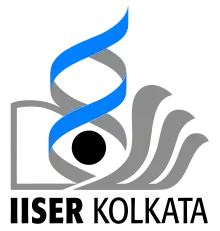Indian Institute of Science Education and Research, Kolkata
Indian Institute of Science Education and Research Kolkata (IISER-K or IISER Kolkata) is an autonomous public university in science and education field located in Mohanpur near the town of Kalyani in Nadia district, West Bengal, India. It was established by the Ministry of Human Resource Development in 2006 and promoted to the status of an Institute of National Importance in 2012 vide the NIT Amendment Act.[3] It is one of seven Indian Institutes of Science Education and Research, and was the first of the IISERs to be established along with IISER Pune. It is considered to be one of the leading institutes of India in terms of research output, and was ranked fifth in the country by the Nature Index (compiled by Nature Research).[4] Bidhan Chandra Krishi Viswavidyalaya(BCKV) & MAKAUT are other nearby Institutions.
 | |
| Motto | Towards Excellence in Science |
|---|---|
| Type | Public university |
| Established | 2006 |
Academic affiliations | Institute of National Importance |
| Chairman | Arvind Natu[1] |
| Provost | Soumitro Banerjee |
| Dean | Balaram Mukhopadhyay |
| Director | Sourav Pal |
Academic staff | 127[2] |
| Students | 1,459[2] |
| Undergraduates | 934[2] |
| Postgraduates | 3[2] |
| 522[2] | |
| Location | , India 22°57′50″N 88°31′28″E |
| Campus | Rural, 201 acres (81 ha) |
| Colours | Blue, white |
| Website | www |

Admissions
Admission is done through the three channels open for all IISERs:[5]
- Kishore Vaigyanik Protsahan Yojana (KVPY)
- Joint Entrance Examination – Advanced (JEE-Advanced)
- State and Central Boards (SCBs)
(Students who are in top 20 percentile of their state boards and CBSE and CISCE are eligible to appear for IISER Aptitude Test (IAT))
From 2019 onwards it was declared on behalf of all IISERs that a maximum of 25% of the seats are assigned to KVPY and JEE-Advanced students. Students applying through SCBs also need to take Common IISER Aptitude Test, and are assigned by merit on this test.[6]
Organisation
The institute has five major departments: biological sciences; chemical sciences; earth sciences; mathematics and statistics; and physical sciences.[7] Additionally, the institute hosts the multi-institutional Center of Excellence in Space Sciences India[8] (CESSI) with participating scientists from ISRO and other astronomy institutes and is involved in research associated with national space science missions. Other centres[9] include the Centre for Advanced Functional Materials, National Centre for High Pressure Studies and a Centre for Climate and Environment Studies. The college also provides minor qualifications through the humanities and social sciences (HSS) department and the computational and data sciences (CDS) department.[10] It also has a field station for ecological, environmental and field studies, a greenhouse, a broadband seismological observatory. The institute jointly runs the Göttingen-Kolkata: Open shell systems (G-KOSS) in fundamentals of molecular spintronics with Georg-August-Universität Göttingen.[11] The institute also hosts the Dirac Supercomputer, which was inaugurated in April 2019. The performance of this supercomputing facility is 78.8 Teraflops.[12]
Events
The college organizes a major annual festival, Inquivesta,[13] which is promoted as one of the first and the biggest science fest of the country.[14]
Inquivesta sees a footfall of 1000+, and has been visited by artists such as Zakir Khan (comedian), Sapan Verma, Nalayak(band) and Anubhav Singh Bassi. It has also received brands such as Baskin-Robbins and Domino's Pizza as its previous partners [15][16] IISER Kolkata has also been hosting VIJYOSHI (the national science camp), along with IISc Bangalore and the Department of Science and Technology, Govt. of India, since 2014.[17]
The institute also has an E-Cell [18] for promoting an entrepreneurial culture in the student body.
Rankings
| University rankings | |
|---|---|
| General – international | |
| Times (Emerging) (2020)[19] | 301–350 |
| General – India | |
| NIRF (Overall) (2020)[20] | 29 |
| NIRF (Universities) (2019)[21] | 25 |
Internationally, the institute was ranked 301–350 among institutes in emerging economics, by the Times Higher Education's "Emerging Economies University Rankings 2020".[19]
In India, the National Institutional Ranking Framework (NIRF) ranked the institute 29 overall in 2020,[20] and 25 among universities in 2019.[21] Considering the statistical data of 2020, IISER Kolkata ranks first among all IISERs in India.
The Nature Index(compiled by Nature Research) ranked the institute among the top 5 academic research-intensive institutes of India.[22]
See also
References
- "Dr. Arvind Natu Nominated as Chair of Board of Governors of IISER Kolkata". sakaltimes.com. 20 March 2019. Retrieved 1 May 2019.
- "NIRF 2021" (PDF). IISER Kolkata.
- "NIT Amendment Act, 2012" (PDF). Retrieved 6 May 2020.
- "2020 tables: Institutions | 2020 tables | Institutions | Nature Index".
- url="https://www.iiseradmission.in/?page_id=25" Retrieved 4 October 2018
- "IISER Admission - 2020". www.iiseradmission.in. Archived from the original on 1 December 2019.
- "Departments at IISER Kolkata". Retrieved 6 May 2020.
- "Center of Excellence in Space Sciences India".
{{cite web}}: CS1 maint: url-status (link) - "Centres at IISER Kolkata".
{{cite web}}: CS1 maint: url-status (link) - "IISER Kolkata - Departments".
- Georg-August-Universität Göttingen - Göttingen-Kolkata: G-KOSS. Uni-goettingen.de (2013-07-07). Retrieved on 2013-10-09.
- "Dirac Supercomputer". www.iiserkol.ac.in. Retrieved 6 May 2020.
- "Inquivesta Home Page". Inquivesta.iiserkol.ac.in. Retrieved 6 May 2020.
- https://www.inquivesta.com/brochure.html
- "Home". Inquivesta.com. Retrieved 6 May 2020.
- "Sponsors". Inquivesta.com. Retrieved 6 May 2020.
- https://vijyoshi.iiserkol.ac.in/.
{{cite web}}: Missing or empty|title=(help) - "E-Cell IISERK Home Page". ecelliiserk.com. Retrieved 24 November 2021.
- "Times Higher Education Emerging Economies University Rankings (2020)". Times Higher Education. 2020. Retrieved 13 March 2020.
- "National Institutional Ranking Framework 2020 (Overall)". National Institutional Ranking Framework. Ministry of Education. 11 June 2020.
- "National Institutional Ranking Framework 2019 (Universities)". National Institutional Ranking Framework. Ministry of Education. 2019.
- "2020 tables: Institutions - academic | 2020 tables | Institutions - academic | Nature Index". www.natureindex.com. Retrieved 22 July 2020.